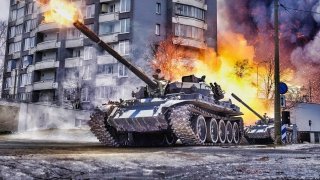America Can't Walk Away from Ukraine—Or the Russia Threat
A defeated Russia may be vengeful, dangerous, and erratic, but a victorious Russia will be infinitely worse. Like it or not, Ukraine—and the U.S. decision to support it or not—will determine which of those two outcomes will happen.
Ukrainian President Volodymyr Zelensky put on a brave face at a press conference in Buenos Aires on the eve of his Tuesday, December 12th visit to Washington, DC, where he is slated to meet President Joe Biden and House Speaker Mike Johnson and press for continued American aid for Ukraine.
When asked about the possibility of a cut-off of American assistance, Zelensky replied: “I am not saddened, because I haven’t lost this battle. We’re not the kind of people who give up when faced with difficulties. Some people start panicking and stop believing in victory, so it’s important to get a hold of oneself and go forward. And we will work to overcome this pause in U.S. assistance to Ukraine. We will overcome this and not just this. We will overcome everything.”
Four Possibilities For Ukraine Aid
It’s clear that President Biden will enthusiastically support Ukraine. It’s also clear that Congressman Johnson will probably be supportive, but conditionally so. In any case, instead of speculating about what these three men may or may not conclude, let’s consider four scenarios, their likely probability, and their likely effects on Ukraine and the world.
Could Aid Be increased?
First on the list is the American decision, perhaps as a result of Zelensky’s charismatic influence on Johnson, actually to increase U.S. assistance.
It’s highly unlikely, at least anytime soon, but should it ever transpire, it would enable Ukraine to launch a decisive counterattack, probably in the spring of 2024, and win, especially if the March presidential elections in Russia entail unhappiness with Vladimir Putin’s endless rule and produce some popular unrest. Given the mood in Congress and the inevitable politicization of the aid issue during the forthcoming U.S. electoral campaigns, it’s hard to imagine such an outcome, either now or in 2024. Biden would have to win convincingly, and Ukraine would have to be on a roll for it to happen.
Could Ukraine Aid Dry Up?
Second on the list, and equally unlikely, is a complete cut-off of American assistance, not just now but for the foreseeable future. Such an eventuality strikes many as disastrous for Ukraine, and, other things being equal, it could be, especially if Donald Trump reoccupies the White House. But would it produce a Ukrainian defeat or preclude a Ukrainian military victory? Fortunately, other things are never equal.
Ukraine could not, in normal circumstances, prevail against a country that has more people, more soldiers, more weapons, and a larger economy. But it could prevail against a country experiencing unacceptably high casualties that would shock even Russians and a deep political crisis sparked by Putin’s incompetence, illegitimacy, growing weakness, and proneness to strategic miscalculations. Still, if Russia’s internal politics remain more or less stable, a cut-off would hamper Ukraine considerably, and even if Europeans fill in some of the gaps, Ukraine would probably be only able to hold onto the territory it has and not make any inroads into Russian-occupied territory.
Other Possibilities
The third and fourth scenarios are sufficiently alike to merit discussion together. In the former, Zelensky convinces the Republicans to agree to Biden’s proposed package, and aid continues at the present level. In the latter, Zelensky fails, but sooner rather than later, both Democrats and Republicans come to their senses and agree to a compromise on immigration and resume U.S. assistance to Ukraine after a hiatus of a few weeks or months. In both cases, Ukraine would hang in there, abetted by the winter months that would make sustained Russian attacks increasingly difficult. If Russia continues to lose men at such alarmingly high rates, Ukraine might even be in the position to try another counterattack in the spring or summer of 2024.
In sum, Ukraine is highly likely, even certain, to survive—at least for the next few years—whatever decision the United States makes with respect to aid. The challenge facing both Ukraine and the United States is longer-term. Will they be ready for another Russian invasion, this time of a NATO member, if Russia emerges undefeated from the current war and Putin’s imperialist agenda remains the order of the day? The first, third, and fourth scenarios would preclude such an unhappy outcome. The second, a complete cut-off, would invite it.
Regardless of how Zelensky’s visit to Washington ends, Americans cannot dispose of the Ukrainian challenge and the Russian threat as easily as some policymakers on the Hill imagine. Unless Putin departs and a massive power struggle rocks the Kremlin, neither Ukraine nor Russia nor their war is going away soon.
A defeated Russia may be vengeful, dangerous, and erratic, but a victorious Russia will be infinitely worse. Like it or not, Ukraine—and the U.S. decision to support it or not—will determine which of those two outcomes will happen.
About the Author
Dr. Alexander Motyl is a professor of political science at Rutgers-Newark. A specialist on Ukraine, Russia, and the USSR, and on nationalism, revolutions, empires, and theory, he is the author of 10 books of nonfiction, including Pidsumky imperii (2009); Puti imperii (2004); Imperial Ends: The Decay, Collapse, and Revival of Empires (2001); Revolutions, Nations, Empires: Conceptual Limits and Theoretical Possibilities (1999); Dilemmas of Independence: Ukraine after Totalitarianism (1993); and The Turn to the Right: The Ideological Origins and Development of Ukrainian Nationalism, 1919–1929 (1980); the editor of 15 volumes, including The Encyclopedia of Nationalism (2000) and The Holodomor Reader (2012); and a contributor of dozens of articles to academic and policy journals, newspaper op-ed pages, and magazines. He also has a weekly blog, “Ukraine’s Orange Blues.”


